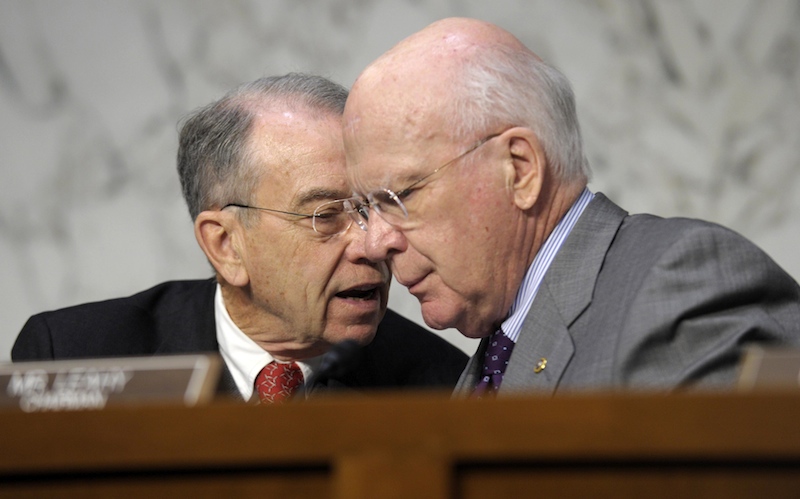On Thursday, the Senate Judiciary Committee will begin examining about 300 proposed amendments to the bipartisan immigration bill, kicking off a new phase in the reform effort. While most are unlikely to pass, the amendments give a valuable preview as to which issues the final battle over immigration will be fought hardest over. You can expect to see lawmakers come back to some of these same debates many times over before any kind of legislation hits the president’s desk.
Gay Rights
As far as contentious amendments go, the bulk have been filed by the more conservative Republican members of the committee who are most likely to vote against a final bill. The big exception is an amendment by Chairman Sen. Patrick Leahy (D-VT) that would allow gay couples the ability to sponsor their spouse or partner for a visa, something that is currently restricted by the Defense of Marriage Act.
Immigrant rights and gay rights groups are pushing hard for the change, which currently forces many gay couples to live abroad. But pro-reform Republicans are dead set against the idea and warn that it could kill immigration reform entirely, especially in the GOP-held House. Evangelical leaders, who have been extremely active in building conservative support for immigration legislation, warned on Wednesday that they’ll pull out if the amendments pass.
“If it [passed], Southern Baptist Convention would not be able to support the bill,” Richard Land, president of the Ethics and Religious Liberty Commission of the Southern Baptist Convention, said Wednesday in a conference call with reporters.
Politically, the only thing that would be worse for the GOP’s new rebranding campaign than immigration reform going down would be immigration reform going down because of opposition to gay rights, so supporters of the amendment think they have a strong hand. But Democrats could be skittish about holding up a final deal over the issue as well if they think they’re close. Either way, expect this to be a major issue going forward.
The Path To Citizenship
Many of the proposed amendments are aimed at undermining — or outright eliminating — the bill’s provision for a path to citizenship for undocumented immigrants.
Sen. Ted Cruz (R-TX), who has called citizenship a deal breaker for conservatives, filed an amendment that would ban anyone who has ever been “willfully present” in the United States without legal status from ever becoming a citizen — basically, everyone the bill’s legalization provisions are designed to help. Sen. Jeff Sessions (R-AL), the Senate’s leading immigration reform opponent, is more subtle in his 49 amendments, but not by much. One would require undocumented immigrants to maintain an income greater than 400% of the poverty level (about $94,000 for a family of four) for a decade straight to qualify for a green card. Another amendment would require Homeland Security officials to conduct in-person interviews with every single undocumented immigrant who applies for legal status, which could slow down implementation of the bill.
All in all, the pro-reform America’s Voice counted 59 amendments in all that “limit or obstruct” the citizenship process. These tougher measures are likely to be defeated in the Senate, but they could find new life if GOP leaders in the House decide to take a more hard-line tack.
On the flip side, some Democrats have submitted measures to make the path to citizenship easier. Sen. Richard Blumenthal (D-CT) filed an amendment that would let young undocumented immigrants who haven’t yet entered high school into an expedited citizenship track for ‘DREAMers’ who obtain a diploma.
The Border Trigger
Along those lines, some of the amendments are designed at making it harder for undocumented immigrants to obtain legal status unless various border security provisions go into effect. Sen. Marco Rubio (R-FL), one of the bill’s co-sponsors, has openly predicted the House will need stricter “trigger” provisions to pass a bill so these bear watching.
Sen. John Cornyn (R-TX), a critic of immigration reform, has submitted a lengthy amendment requiring “operational control” of the border, a standard that Department of Homeland Security officials have criticized for being too inflexible. It also establishes a Border Commission of Southwestern officials to monitor security — the current draft only creates such a commission if the administration fails in its own attempts to implement the bill. An amendment by Sessions would require another 700 miles of border fencing.
The Boston Bombing
There’s not much of an immigration policy angle to the Boston Marathon bombing given that the two suspects entered the United States as refugees when they were children, but pro-reform and anti-reform senators alike want to toughen up the bill’s security measures to address general terrorism concerns. These discussions have led to some tense moments in the Judiciary Committee already, so it’s worth keeping an eye on how the first round of Boston-related amendments fare.
Sen. Jeff Sessions (R-AL), for example, has an amendment “[t]o provide the denial of benefits and removal of terrorist aliens,” a response to news reports that suspected bomber Tamerlan Tsarnaev received state welfare.
Sen. Lindsey Graham (R-SC), one of the co-sponsors of the immigration bill, submitted three amendments related to security, including one that would require additional security screening for immigrants from any country that “represents a threat, or contains groups or organizations that represent a threat, to the national security of the United States.”






